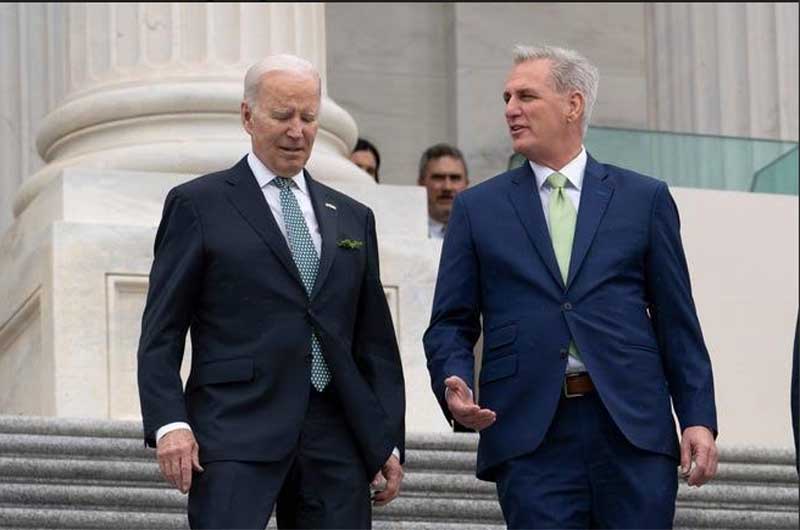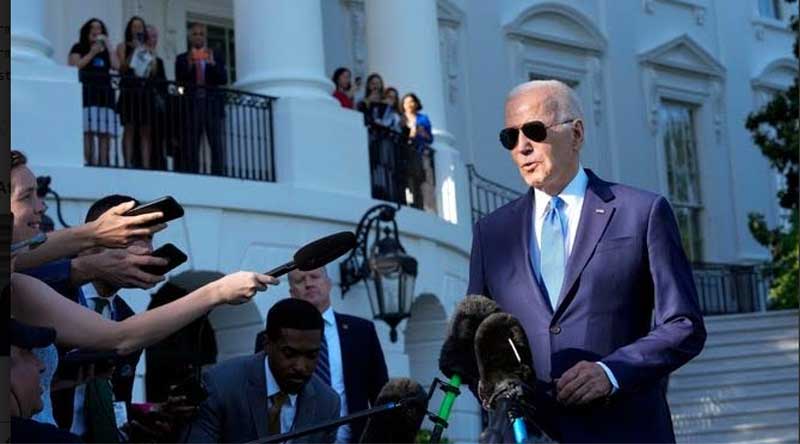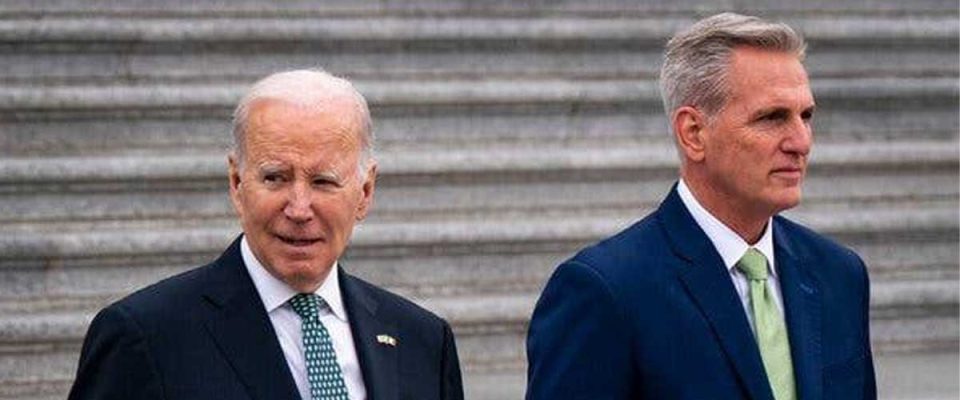By TN Ashok
WASHINGTON , May 30 : With just 48 hours to run out, both White House and the US house of Congress is tense over the debt ceiling crisis as the deal between President Joe Biden and Speaker Kevin MacCarthy needs a bipartisan vote and the Presidents sign off to enact the law to raise the borrowing limit. The debt ceiling limit expires on June 01 when Treasury Secretary Yanet Yellen will start prioritizing payments to investors and domstic beneficiaries before it goes bankrupt.
While the deal has shown many concessions across the aisles between Biden and McCarathy in the interests of saving American pride with investors globally, its likely to annoy both Democrats and Republicans equally as they see it as both of them caving in to the other.

Multiple media reports suggest that a possible default, despite President Joe Biden and House Speaker Kevin McCarthy striking a deal late Saturday to raise the debt ceiling in exchange for caps on future spending, could send shock waves across the global economy and stock exchanges worldwide if the US does not honour to pay out interest on the treasury bonds held by different governments and money markets, reports said.
Biden and McCarthy are tensed up as neither the republicans nor the democrats see the New Deal as a good compromise but a sell out to each other in a desperate measure to enable the US treasury to meet its international and domestic obligations to make the pay outs to stake holders.
While the White House has successfully managed to stave more sweeping budget cuts that House Republicans pushed in their own legislation , thus irritating the GOP members, the democrats are not at all pleased with just keeping intact the president’s signature domestic programs.

The New Deal , which first started as a 10 year moratorium on Bidens spending , later reduced to 6 years while Biden demanded a two year limit, faces a very uncertain future in the Congress , where progressive Democrats and hardline Republicans have both aggressively criticized components of the agreement. McCarthy, titles the bill “The Fiscal Responsibility Act,” is hoping for a bi-partisan vote Wednesday in the House.
There are seven major provisions in the New Deal of Biden-McCarthy that has resulted in the Fiscal Responsibility act up for passage tomorrow in the house.
The debt ceiling is to be raised so that government borrowing continues through 2024 to 2025.
The ad hoc deal would raise the debt limit clearly defining how much the government can borrow through the end of 2024, averting a default that could happen June 5 if the debt ceiling is not raised. This was always Biden’s top priority. The president could not afford an economic disaster to unfold as as result of a default, the USA today reported.
The two-year extension on raising borrowing limit entails Congress not having to deal with the debt ceiling again until after the 2024 election. The scenario could change after November 2024 after the Presidential election that could shake up power in Congress and control of the White House. If Biden wins re-election and Democrats regain control of the House, this year’s brinksmanship would be avoided, media reports said.
Restricting the spending cuts for two years
The New Deal caps annual discretionary spending by the US government for two years, retaining non-defense expenditure levels flat next year and raising it by 1% in 2025. This means that funding for domestic programs will remain the same next year particularly for Social Security and Medicare, the real concern of Biden and the democrats.
The biggest hurdles in the negotiations between Biden and McCarthy were spending caps that assumed top priority for Republicans, who initially fought for 10 years of annual spending limits and then six years as negotiations continued. Democrats wanted it for two years which they seem to have extracted from the GOP leaders.
What has emerged in the New Deal is a classic give and take for both sides with neither side ending up as winner takes all, financial analysts said. .
Interestingly, the New Deal , sets six years of appropriations “targets,” and unlike the first two years of caps, its not upto to any one to enforce the targeted spending levels. The agreement encompasses funding increases to improve medical care for military veterans.
Changes for food stamps and other aid
Biden and McCarthy virtually battled over expanded work requirements for welfare programmes, all along pushed aggressively by the GOP leaders and resisted equally strongly by the White House, that led to a last minute hold up on the New Deal.
So, a final agreement that was hammered out by Biden and McCarthy entails setting time limits for the Supplemental Nutrition Assistance Program . This provision defines how long able-bodied adults 54 years old or younger without dependent children can receive food stamps if they do not meet certain work requirements.
In major victory for the White House, the deal would expand food benefits for the homeless and veterans, reports said. Additional work requirements for recipients of the Temporary Assistance for Needy Families program becomes valid , but changes are not contemplated for Medicaid, as Biden opposed.
IRS Funding a bone of contention between GOP and Democrats
Republicans won a major victory as the deal rolls back $10 billion out of the contemplated $80 billion in IRS funding provided and approved last year in what was designed to crack down on wealthy Americans and corporations reportedly evading taxes.
Republicans have been spreading the propaganda that the recruitment of 87,000 new IRS officers and regulators was an attempt to pry into the lives of hard working Americans, rebutted by the White House as technology had become out-dated and work force was depleted to speed up tax returns.
The money is meant to modernize a tax collection agency plagued with understaffing in an effort to crack down on wealth tax cheats, media reports said .
The gap between taxes imposed and collected has constantly widening . It has actually jumped considerably, from $441 billion per annum between 2011 and 2013 to $584 billion in 2019. In the next 10 years, it’s estimated to cross $7 trillion, making a major mark down on tax collections essentially used for social welfare programmes.
Unspent COVID-19 rescue money rescinded
Biden has caved in to the republicans on their rallying demand for clawing back on billions in unspent COVID-19 relief funding approved by Congress during the Biden and Trump presidencies. House Republican leadership in a memo circulated to GOP leaders said rollbacks include slashing $400 million from the Centres for Disease Control (CDC) Prevention’s “Global Health Fund.”
Public health advocates are worried that such rescinding of funds will hit badly any efforts to prepare for the next virus attack and yet attempt to draw funds from a persistently underfunded public health system. House Democrats said money is still needed to keep the Strategic National Stockpile full of essential medical supplies, report said .
Wealthy or Corporations Not to Escape fresh hefty taxes
Biden’s hope in clinching the new deal was that he would limit spending cuts by making up with enhanced revenue rolling back former President Donald Trump’s 2017 tax cuts for the wealthiest Americans and corporations and also ending tax loopholes used by the super wealthy. But the deal reached with McCarthy doesn’t address taxes at all.
As the deal leaves untouched the issue of tax system, Biden will go ahead with his penchant call for wealthy Americans to “pay their fair share” in taxes. This is the centre piece of his reelection campaign to appease the urban and rural voters in the middle and lower middle class strata of society.
Inflation Reduction Act, student loan forgiveness programmes untouched
The White House scored a major victory retaining the Inflation Reduction Act − the president’s major initiative towards climate change control technologies, and lowering cost of prescription drugs ,the students loan forgiveness programme benefitting millions of Americans.
The Republicans had originally proposed eliminating both in legislation that the GOP-controlled House passed last month. The all important change on student loans requires borrowers, granted pauses from their monthly payments during the pandemic, to recommence paying back the government. The change effectively codifies Biden’s plan to restart payments after the Supreme Court takes up his student loan forgiveness program.
